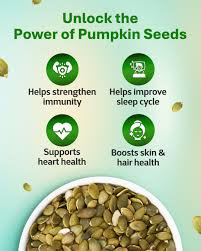.jpeg)
When it comes to superfoods, pumpkin seeds (also known as pepitas) often don’t get the attention they deserve. These small, crunchy seeds are packed with nutrients that can significantly boost your health when consumed daily. Whether you sprinkle them on salads, blend them into smoothies, or simply snack on them, incorporating pumpkin seeds into your diet can offer a wide range of benefits that promote overall well-being.
Let’s dive into why you should make pumpkin seeds a part of your daily routine and the incredible benefits they bring to the table.
.jpeg)
1. Packed with Nutrients for Optimal Health
Pumpkin seeds are a true powerhouse of nutrition. Just a small handful (about 1 ounce or 28 grams) delivers a rich supply of essential vitamins and minerals, including:
- Magnesium: Crucial for heart health, muscle function, and regulating blood sugar.
- Zinc: Supports immune function, skin health, and hormone balance.
- Iron: Helps transport oxygen throughout the body and keeps energy levels up.
- Copper: Vital for nerve health and iron absorption.
- Vitamin K: Important for blood clotting and bone health.
- Phosphorus: Supports healthy bones and teeth.
This combination of nutrients makes pumpkin seeds an excellent addition to your diet for overall vitality.
2. Boosts Heart Health
One of the standout benefits of pumpkin seeds is their ability to support heart health. These seeds are rich in antioxidants like vitamin E and carotenoids, which help reduce inflammation and lower the risk of heart disease. Moreover, pumpkin seeds are an excellent source of magnesium, a mineral that helps regulate blood pressure, relax blood vessels, and reduce the risk of heart attacks and strokes.
Additionally, pumpkin seeds contain omega-3 fatty acids (in the form of ALA, and alpha-linolenic acid), which promote healthy cholesterol levels and improve overall cardiovascular health.
3. Promotes Better Sleep
Struggling to get a good night’s rest? Pumpkin seeds might be the natural solution. These seeds are a good source of tryptophan, an amino acid that helps the body produce serotonin and melatonin—two hormones that regulate sleep. A small handful of pumpkin seeds before bedtime may help you fall asleep faster and enjoy a deeper, more restful sleep.
4. Supports Prostate Health
For men, pumpkin seeds have long been celebrated for their potential benefits in supporting prostate health. The seeds are rich in zinc, an essential mineral that plays a key role in maintaining prostate function and overall reproductive health. Regular consumption of pumpkin seeds may help reduce the risk of benign prostatic hyperplasia (BPH), a condition where the prostate becomes enlarged, leading to urinary issues.
5. Promotes Healthy Skin and Hair
Pumpkin seeds are rich in antioxidants, vitamin E, and zinc, all of which are crucial for maintaining healthy skin and hair. Zinc, in particular, plays a vital role in collagen production, which is important for skin elasticity and repairing damaged tissue. These nutrients can also help fight acne and support healthy, shiny hair by nourishing hair follicles and promoting growth.
6. Supports Healthy Digestion
Fiber is essential for digestive health, and pumpkin seeds are an excellent source of both soluble and insoluble fiber. Consuming pumpkin seeds regularly can help keep your digestive system running smoothly, prevent constipation, and improve gut health. The high fiber content also helps you feel full for longer, which can aid in weight management.
7. Rich in Antioxidants for Immune Support
Antioxidants play a critical role in protecting your body from free radical damage, which can lead to chronic diseases and premature aging. Pumpkin seeds are rich in antioxidants like vitamin E, carotenoids, and polyphenols, which help strengthen the immune system and protect against oxidative stress. Daily consumption of these seeds can help keep your immune system strong and resilient.
.jpeg)
8. Helps Manage Blood Sugar Levels
For those with type 2 diabetes or those at risk, pumpkin seeds may be beneficial in managing blood sugar levels. These seeds are rich in magnesium, which plays a role in improving insulin sensitivity and maintaining balanced blood sugar levels. Several studies suggest that pumpkin seeds may help lower blood sugar levels, making them a great food for those managing diabetes or prediabetes.
9. May Reduce Inflammation
Chronic inflammation is linked to many health conditions, including heart disease, arthritis, and diabetes. The antioxidants and omega-3 fatty acids in pumpkin seeds can help reduce inflammation in the body. Consuming pumpkin seeds regularly may help lower the risk of inflammatory diseases and support overall wellness.
How to Incorporate Pumpkin Seeds into Your Diet
.jpeg)
The great thing about pumpkin seeds is their versatility. Here are a few simple ways to add them to your daily meals:
- Snack on Them: Simply roast them with a pinch of salt or seasoning for a healthy, crunchy snack.
- Add to Salads: Sprinkle pumpkin seeds on top of your salads for an extra crunch and nutrient boost.
- Smoothies: Blend pumpkin seeds into your morning smoothie for a nutrient-packed start to your day.
- In Baked Goods: Add them to muffins, granola bars, or bread for a crunchy, healthy twist.
- Mix with Yogurt: Combine pumpkin seeds with your favorite yogurt and fruits for a wholesome snack or breakfast.
Conclusion
Pumpkin seeds are a small yet mighty superfood that offers a wealth of health benefits. From promoting heart health and better sleep to supporting healthy digestion and skin, these nutrient-packed seeds are a great addition to any diet. Whether you’re looking to boost your immune system, manage blood sugar levels, or improve your skin and hair, pumpkin seeds can help you achieve your wellness goals.
So, next time you carve a pumpkin, don’t throw away those seeds—save them and make them a daily part of your routine. Your body will thank you for it!
